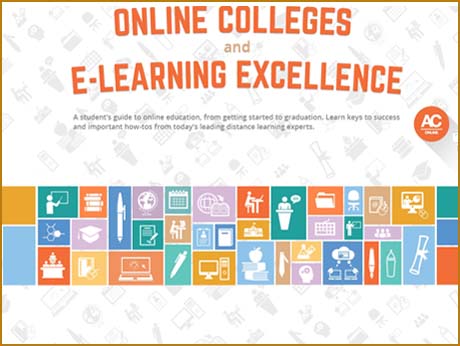
March 25, 2014: "Someone enrolled in a MOOC will have a very different experience compared to that of someone enrolled in a structured online class designed to be applied toward a degree." This is a quote by Claire Pettner, Director of Recruitment and Retention, Colorado State University Online Plus, carried by Accredited Online Degree Program Search on a web page offering a free guide to e-learning and online colleges.
And that ofcourse, is the crux of the problem. After the huge hype surrounding Massively Open Online Courses (MOOC), academia is waking up to the rather alarmingly high dropout rates among students signing up for MOOC courses.
The main goal of the Affordable Colleges Foundation guidebook is to help students learn online more effectively. This includes 20 pages dedicated to distance learning basics, critical how-tos, and many of the misconceptions that surround the virtual classroom. And to make sure students have the right information from the right people, the compilers interviewed experts at The Sloan Consortium, The Open University, and more than a dozen other distinguished institutions.
The guide says: Don't confuse "flexible" with "easy." Online learning at reputable schools is equally or more rigorous than classroom learning. It is not a shortcut to a degree. Colleges emphasize that their online programs offer the same curriculum taught by the same professors who teach their campus-based courses. These professors expect a high level of performance from students. You also can’t hide in the back row in online learning.
One of the benefits of online study is that you're not restricted by geographic boundaries. This broadens your options considerably, so take the time to research institutions, programs, learning options, and teaching styles to make sure you're choosing the absolute best option to meet your educational goals.
Some more tips: The online learning format you choose should be directly related to your educational goals and the type of learning experience you desire. Some questions to ask yourself:
- Do you want to learn more about a topic without needing to receive credit for the class?
- Do you want to obtain credit for the coursework?
- Is your goal to pursue a degree?
- Do you want to study completely online, or do you want opportunities to meet the professors and students in person?
- Are you looking for a cohort model, where students begin and go through the program as a group?
- Do you want small class sizes, larger lecture formats, or a combination of both?
- Can you take tests online or will you need to travel to a proctored location?
Anyone interested in distance learning can access, download, and print the free guide "E-Learning Best Practices and Online College Success" here: http://www.affordablecollegesonline.org/online-colleges-guide/
We do realize, Affordable Colleges Online is a US based resource, concentrating on American online colleges -- but there is no reasons students any where shouldn't find a course they would like to take -- online!